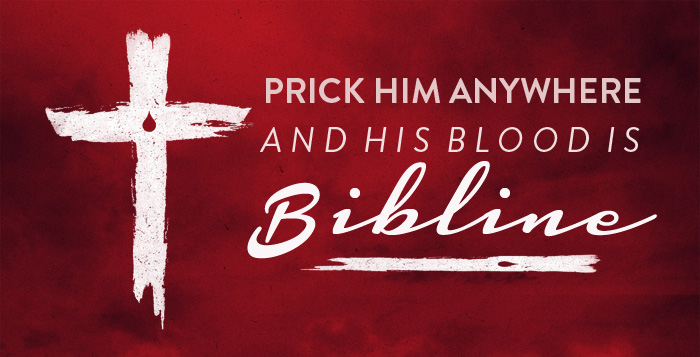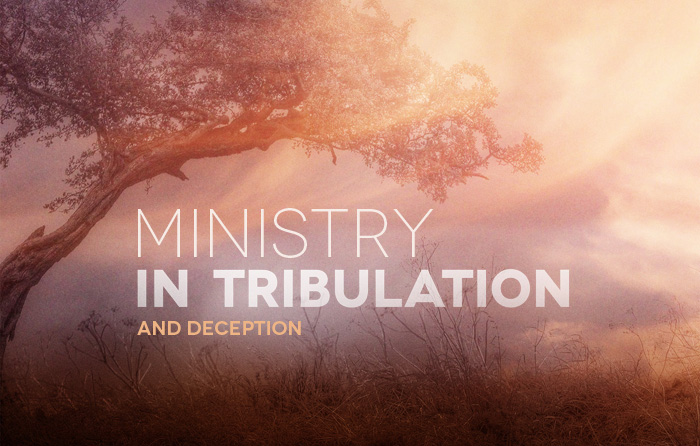“Nothing but love of Christ, can make a truly faithful pastor, or evangelist, assiduous in all his services, and indefatigable in the most private and self-denying duties of his office.” – Archibald Alexander, The Pastoral Office, 8.
Category Archives: Pastoral Ministry
Training Men for Ministry

I’ve spent a fair amount of time this week with the writings of Archibald Alexander, the first professor of Princeton Theological Seminary. He and a committee of men were commissioned to create a spiritual ethos in the seminary with a theological curriculum to fuel it.
What kind of atmosphere did they hope to promote? The seminary was intended to be (in the timeless words of Samuel Miller),
a nursery of vital piety as well as of sound theological learning, and to train up persons for the ministry who shall be lovers as well as defenders of truth as it is in Jesus, friends of revivals of religion, and a blessing to the Church of God.
Did you notice each part packed into that statement? Princeton Seminary was to be a place where men learned:
- Vital piety
- Sound doctrine
- Love for Christ-centered truth
- An ability to defend truth
- Eagerness for revival
- How to be a blessing to the church
If you’re involved in seminary administration, the application of these truths is clear enough. But what if you’re not a seminary administrator or professor? My suggestion is that you take the six points above and let them inform your goals with pastoral interns, elder candidates, or brothers in your church considering the gospel ministry.
What kind of an atmosphere are you creating in your church?
Favorite Books of 2015
Whittling down the list of books I read each year to a select few favorites is always an enjoyably difficult exercise. This year I decided to employ two criteria for my list of favorite books from 2015:
- Does this book have unusual benefit to ordinary pastors?
- Is this a book worth rereading every year?
Those two simple questions helped me pare down all the titles I’ve read to the following books, each of unique value to the ministry of ordinary pastors. Then I have three more titles worth your interest at the end.
Favorite Books for Ordinary Pastors Published in 2015
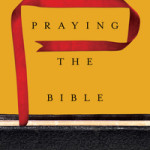 #8—Praying the Bible by Don Whitney. Short, concise, and practical, I could see Whitney’s latest book offering wisdom many church members—and church leaders—are looking for. In Praying the Bible Whitney says, “If . . . mind-wandering boredom describes your experience in prayer, I would argue that if you are indwelled by the Holy Spirit—if you are born again—then the problem is not you; it is your method.” I think he’s right, especially when you understand the method he has in mind. The method is praying through Scripture, particularly the Psalms. He’s spot on to say that such a method of prayer gives structure, purpose, and longevity. This one could transform your prayer life.
#8—Praying the Bible by Don Whitney. Short, concise, and practical, I could see Whitney’s latest book offering wisdom many church members—and church leaders—are looking for. In Praying the Bible Whitney says, “If . . . mind-wandering boredom describes your experience in prayer, I would argue that if you are indwelled by the Holy Spirit—if you are born again—then the problem is not you; it is your method.” I think he’s right, especially when you understand the method he has in mind. The method is praying through Scripture, particularly the Psalms. He’s spot on to say that such a method of prayer gives structure, purpose, and longevity. This one could transform your prayer life.
 #7—What Does the Bible Really Teach about Homosexuality? by Kevin DeYoung. If ever there was a book uniquely suited for our time it’s DeYoung’s latest. What Does the Bible . . . ? is after an admittedly small slice of the categorical pie, for DeYoung writes, “This is a Christian book, with a narrow focus, defending a traditional view of marriage” (15). The work’s utility lies in its simplicity: part one deals with the five most debated passage on homosexuality and part two deals with the seven most common objections to the traditional view. As we should expect by now, DeYoung is winsomely logical, ruthlessly biblical, and pastorally helpful. Every pastor should have multiple copies on hand to distribute to church members.
#7—What Does the Bible Really Teach about Homosexuality? by Kevin DeYoung. If ever there was a book uniquely suited for our time it’s DeYoung’s latest. What Does the Bible . . . ? is after an admittedly small slice of the categorical pie, for DeYoung writes, “This is a Christian book, with a narrow focus, defending a traditional view of marriage” (15). The work’s utility lies in its simplicity: part one deals with the five most debated passage on homosexuality and part two deals with the seven most common objections to the traditional view. As we should expect by now, DeYoung is winsomely logical, ruthlessly biblical, and pastorally helpful. Every pastor should have multiple copies on hand to distribute to church members.
 #6—The Pastor Theologian by Gerald Hiestand and Todd Wilson. The Pastor Theologian well surpassed my already high expectations as the authors promote a compelling vision for recovering the long hallowed, but now forgotten, role of the pastor-theologian. Full of piercing historical and sociological analysis, rich reflection on God’s word, and surprisingly helpful tips, this is a book every pastor should read. Not all of us will become Ecclesial Theologians (the true burden of Wilson and Hiestand’s model), yet we all need fresh encouragement to zealously pursuing a learned ministry.
#6—The Pastor Theologian by Gerald Hiestand and Todd Wilson. The Pastor Theologian well surpassed my already high expectations as the authors promote a compelling vision for recovering the long hallowed, but now forgotten, role of the pastor-theologian. Full of piercing historical and sociological analysis, rich reflection on God’s word, and surprisingly helpful tips, this is a book every pastor should read. Not all of us will become Ecclesial Theologians (the true burden of Wilson and Hiestand’s model), yet we all need fresh encouragement to zealously pursuing a learned ministry.
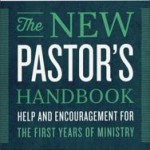 #5—The New Pastor’s Handbook by Jason Helopoulos. Believe the hype, Helopoulos’ book is indeed a “must read” for young pastors (seasoned pastors will surely benefit as well). As was the case in his first book, the instruction here is full of grace and truth. The New Pastor’s Handbook consists of forty-eight short chapters broken into five parts: The Beginning, Starting Out Strong, Encouragements, Pitfalls of Young Pastors, and Joys of Ministry. If any part is required reading it is the section on pastoral pitfalls; the one-two punch of “Taking Yourself Too Seriously” and “Not Taking Yourself Seriously Enough” hits home hard. Joe Thorn overstates his case by saying TNPH “will prove to be as helpful as The Christian Ministry by Charles Bridges.” But he doesn’t overstate the case by much, this book is that good.
#5—The New Pastor’s Handbook by Jason Helopoulos. Believe the hype, Helopoulos’ book is indeed a “must read” for young pastors (seasoned pastors will surely benefit as well). As was the case in his first book, the instruction here is full of grace and truth. The New Pastor’s Handbook consists of forty-eight short chapters broken into five parts: The Beginning, Starting Out Strong, Encouragements, Pitfalls of Young Pastors, and Joys of Ministry. If any part is required reading it is the section on pastoral pitfalls; the one-two punch of “Taking Yourself Too Seriously” and “Not Taking Yourself Seriously Enough” hits home hard. Joe Thorn overstates his case by saying TNPH “will prove to be as helpful as The Christian Ministry by Charles Bridges.” But he doesn’t overstate the case by much, this book is that good.
#4—How to Walk Into Church by Tony Payne . The fact that How to Walk Into the Church is more a booklet than a book and yet still manages to rank so high on my list tells you how good I found it to be. Payne’s says we should walk into church praying about who we will sit next to. The book goes on to offer beautiful, warm, and simple counsel on the joyful necessity of gathering weekly with the church. One great thing you might do next year is get a case of this book and hand out a copy to ever family in your church. I believe How to Walk Into Church contains life-changing instruction for many ordinary Christians . . . maybe even ordinary pastors.
. The fact that How to Walk Into the Church is more a booklet than a book and yet still manages to rank so high on my list tells you how good I found it to be. Payne’s says we should walk into church praying about who we will sit next to. The book goes on to offer beautiful, warm, and simple counsel on the joyful necessity of gathering weekly with the church. One great thing you might do next year is get a case of this book and hand out a copy to ever family in your church. I believe How to Walk Into Church contains life-changing instruction for many ordinary Christians . . . maybe even ordinary pastors.
 #3—Rejoicing in Christ by Michael Reeves. If there is a contemporary author I love more than Mike Reeves, I’m hard pressed to think who it could be. He’s written my favorite introduction to the Reformation, my favorite introduction to the Trinity, and with Rejoicing in Christ he’s written my favorite populary-level intro to Christology. I’m not sure, however, if this book appropriately falls into the category of “Christology.” Whenever I think of Christology, I think of textbook-ish works on the hypostatic union, eternal generation, and the like. Those volumes are vital indeed; we also need books that simply show us how to stare at Jesus—and do so with joy and hope! Rejoicing in Christ models exultational Christology at its finest.
#3—Rejoicing in Christ by Michael Reeves. If there is a contemporary author I love more than Mike Reeves, I’m hard pressed to think who it could be. He’s written my favorite introduction to the Reformation, my favorite introduction to the Trinity, and with Rejoicing in Christ he’s written my favorite populary-level intro to Christology. I’m not sure, however, if this book appropriately falls into the category of “Christology.” Whenever I think of Christology, I think of textbook-ish works on the hypostatic union, eternal generation, and the like. Those volumes are vital indeed; we also need books that simply show us how to stare at Jesus—and do so with joy and hope! Rejoicing in Christ models exultational Christology at its finest.
 #2—The Compelling Community by Mark Dever and Jamie Dunlop. Dever’s book The Deliberate Church is the resource, outside of Scripture, we value most when training future officers at IDC. It offers an astonishing amount of biblical truth and practical wisdom on matters of pastoral ministry, church polity, corporate worship, and even gets down to things like hiring church staff and running elders’ meetings. Whereas The Deliberate Church aims to set a foundation for a healthy church, The Compelling Community is something like a sequel that tries to let us know—as difficult as it can be to capture in print—what a healthy church feels like. And what a fantastic sequel this is! The Compelling Community offers a vision for healthy church life from which any pastor or church leader can profit. I found the discussion of a church being a place of either “Gospel Plus Community” or “Gospel Revealing Community” worth its weight in gold. I’ll cast aside all other superlatives that come to my mind and simply say, “Get this book!”
#2—The Compelling Community by Mark Dever and Jamie Dunlop. Dever’s book The Deliberate Church is the resource, outside of Scripture, we value most when training future officers at IDC. It offers an astonishing amount of biblical truth and practical wisdom on matters of pastoral ministry, church polity, corporate worship, and even gets down to things like hiring church staff and running elders’ meetings. Whereas The Deliberate Church aims to set a foundation for a healthy church, The Compelling Community is something like a sequel that tries to let us know—as difficult as it can be to capture in print—what a healthy church feels like. And what a fantastic sequel this is! The Compelling Community offers a vision for healthy church life from which any pastor or church leader can profit. I found the discussion of a church being a place of either “Gospel Plus Community” or “Gospel Revealing Community” worth its weight in gold. I’ll cast aside all other superlatives that come to my mind and simply say, “Get this book!”
 #1—Knowing Christ by Mark Jones. If Helopoulos’s book is a modern version of Bridges’ The Christian Ministry then Mark Jones’ latest is a modern-day The Glory of Christ by John Owen. Knowing Christ is devotional Christology par excellence. Those familiar with Jones will know he is a faithful guide on the Christological paths; he employs the full range biblical theology, systematic theology, and historical theology (especially the Puritans) to make the heart happy in Christ. This is not a book to read quickly; I’d recommend reading one chapter during each day’s daily devotions. I was regularly so moved at the glories of Christ that I had to put the book down to contemplate, pray, and worship. May this book receive the widest audience possible.
#1—Knowing Christ by Mark Jones. If Helopoulos’s book is a modern version of Bridges’ The Christian Ministry then Mark Jones’ latest is a modern-day The Glory of Christ by John Owen. Knowing Christ is devotional Christology par excellence. Those familiar with Jones will know he is a faithful guide on the Christological paths; he employs the full range biblical theology, systematic theology, and historical theology (especially the Puritans) to make the heart happy in Christ. This is not a book to read quickly; I’d recommend reading one chapter during each day’s daily devotions. I was regularly so moved at the glories of Christ that I had to put the book down to contemplate, pray, and worship. May this book receive the widest audience possible.
Favorite Book for Ordinary Pastors Not Published in 2015
Words to Winners of Souls by Horatius Bonar. How I’ve made it over a decade in ministry without reading Bonar’s classic is a mystery to me. The influence of the tiny island of Scotland on the Christian history is stunning. And most of it stems from the view of ministry that has permeated its pastors for centuries. In Words to Winners of Souls Bonar casts a vision for gospel ministry that is simultaneously comforting and convicting. Perhaps the greatest section of the book isn’t even written by Bonar. In 1651, a collection of pastors in Scotland came together a drew up “an humble acknowledgment of the sins of the ministry.” They sensed God’s judgment upon the country and viewed themselves as no small part of the problem. Horatius Bonar called the subsequent ministerial confession “one of the fullest, most faithful and most impartial confessions of ministerial sin ever made.” Read this and don’t be surprised if you weep for greater faithfulness in stewarding the gospel.
by Horatius Bonar. How I’ve made it over a decade in ministry without reading Bonar’s classic is a mystery to me. The influence of the tiny island of Scotland on the Christian history is stunning. And most of it stems from the view of ministry that has permeated its pastors for centuries. In Words to Winners of Souls Bonar casts a vision for gospel ministry that is simultaneously comforting and convicting. Perhaps the greatest section of the book isn’t even written by Bonar. In 1651, a collection of pastors in Scotland came together a drew up “an humble acknowledgment of the sins of the ministry.” They sensed God’s judgment upon the country and viewed themselves as no small part of the problem. Horatius Bonar called the subsequent ministerial confession “one of the fullest, most faithful and most impartial confessions of ministerial sin ever made.” Read this and don’t be surprised if you weep for greater faithfulness in stewarding the gospel.
Favorite Non-Fiction Book
 The Wright Brothers by David McCullough. There isn’t anyone from whom I’d rather learn about American history than David McCullough. The two-time Pulitzer winner writes with such a warmth and familiarity of understanding I feel as though I’m listening to my grandfather tells stories of days gone by. His latest work focuses on how Wilbur and Orville Wright created their “flying machine.” This story of the boys from Dayton, Ohio is quintessentially “American”—two men rising from obscurity to change the world through undaunted industry and ingenuity. The Wright Brothers is a story we all should know. And McCullough’s reverent and beautiful prose is the perfect guide.
The Wright Brothers by David McCullough. There isn’t anyone from whom I’d rather learn about American history than David McCullough. The two-time Pulitzer winner writes with such a warmth and familiarity of understanding I feel as though I’m listening to my grandfather tells stories of days gone by. His latest work focuses on how Wilbur and Orville Wright created their “flying machine.” This story of the boys from Dayton, Ohio is quintessentially “American”—two men rising from obscurity to change the world through undaunted industry and ingenuity. The Wright Brothers is a story we all should know. And McCullough’s reverent and beautiful prose is the perfect guide.
Favorite Fiction Book
 The Bone Tree by Greg Iles. I loved Iles’ Natchez Burning so much that I named it my favorite fiction book of 2014. Natchez was the first book in a trilogy and ever since reading it I’ve tried to temper my expectations for its sequel, The Bone Tree. I am delighted to say there was no need for such tempering; The Bone Tree is excellent! Iles picks up right where the narrative left off and for 800 pages, with unrelenting force, he never lets the reader go. The pages fly as Penn Cage tries to save his father, uncover the truth about Kennedy’s assassination, and take justice into his hands when he loses a loved one. I was shocked to see just how many loose ends Iles tied up from Natchez while simultaneously opening up new ones that will make any reader ravenous to read the trilogy’s final entry.
The Bone Tree by Greg Iles. I loved Iles’ Natchez Burning so much that I named it my favorite fiction book of 2014. Natchez was the first book in a trilogy and ever since reading it I’ve tried to temper my expectations for its sequel, The Bone Tree. I am delighted to say there was no need for such tempering; The Bone Tree is excellent! Iles picks up right where the narrative left off and for 800 pages, with unrelenting force, he never lets the reader go. The pages fly as Penn Cage tries to save his father, uncover the truth about Kennedy’s assassination, and take justice into his hands when he loses a loved one. I was shocked to see just how many loose ends Iles tied up from Natchez while simultaneously opening up new ones that will make any reader ravenous to read the trilogy’s final entry.
Click here to see my Favorite Books of 2014 and Favorite Books of 2013.
A Ministry Confessional
In 1651 a collection of pastors in Scotland came together a drew up “an humble acknowledgment of the sins of the ministry.” They sensed God’s judgment upon the country and viewed themselves as no small part of the problem. Horatius Bonar called the subsequent ministerial confession “one of the fullest, most faithful and most impartial confessions of ministerial sin ever made.”
I’d have to agree with Bonar—I’ve never read anything like this before yesterday. Rarely could I go a few sentences into the document without pausing to examine my own life and repent of sin (it thus took a long time to get through it!). I’ve copied a substantial excerpt below and encourage you to read prayerfully and humbly. It may just be the most challenging reading you encounter this week.
Before Entering the Ministry
Lightness and profanity in conversation, unsuitable to that holy calling which they strove for, not thoroughly repented of. Not studying to be in Christ before they be in the ministry; nor to have the practical knowledge and experience of the mystery of the gospel in themselves before they preach it to others. Neglecting to fit themselves for the work of the ministry, in not improving prayer and fellowship with God, opportunities of a living ministry, and other means, and not mourning for these neglects. Not studying self-denial, nor resolving to take up the cross of Christ. Negligence to entertain a sight and sense of sin and misery; not wrestling against corruption, nor studying mortification and subduedness of spirit.
Entering the ministry without respect to a commission from Jesus Christ, by which it hath come to pass that many have run unsent. Entering the ministry not from the love of Christ, nor from a desire to honor God in gaining of souls, but for a name and for a livelihood in the world, in spite of a solemn declaration to the contrary when they became a minister.
After Entering the Ministry
Ignorance of God; lack of nearness with Him, and taking up little of God in reading, meditating, and speaking of Him. Exceeding great selfishness in all that we do; acting from ourselves, for ourselves, and to ourselves. Not caring how unfaithful and negligent others were, so being it might contribute a testimony to our faithfulness and diligence, but being rather content, if not rejoicing, at their faults. Least delight in those things wherein lieth our nearest communion with God; great inconstancy in our walk with God, and neglect of acknowledging Him in all our ways. In going about duties, least careful of those things which are most remote from the eyes of men. Seldom in secret prayer with God, except to fit for public performance; and even that much neglected, or gone about very superficially.
Glad to Find Excuses
Glad to find excuses for the neglect of duties. Neglecting the reading of Scriptures in secret, for edifying ourselves as Christians; only reading them just enough to do our duty as ministers, and ofttimes neglecting even that. Not given to reflect upon our own ways, nor allowing conviction to have a thorough work upon us; deceiving ourselves by resting in the fact that our hard conscience does not bother us, and looking upon the same as an evidence of a real change of state and nature.
Poor guarding of and watching over the heart, and carelessness in self-searching; which makes much unacquaintedness with ourselves and creates separation from God. Not guarding nor wrestling against seen and known evils. Easily drawn away with the temptations of the time, and other particular temptations, according to our inclinations and fellowship.
Instability and wavering in the ways of God, through the fears of persecutions, hazard, or loss of reputation; and declining duties because of the fear of jealousies and reproaches. Not esteeming the cross of Christ and sufferings for His name as honorable, but rather escaping from sufferings, due to self-love. Deadness of spirit, even after all the sore strokes of God upon the land. Little conscience made of secret humiliation and fasting, by ourselves apart and in our families, that we might mourn for our own and the land’s guiltiness and great backslidings; and little applying of public humiliation to our own hearts. Finding of our own pleasure, when the Lord calls for our humiliation.
Not laying to heart the sad and heavy sufferings of the people of God abroad, and the nonthriving of the kingdom of Jesus Christ and the power of godliness among them. Refined hypocrisy; desiring to appear what, indeed, we are not. Studying more to learn the language of God’s people than their practice. Artificial confessing of sin, without repentance; professing to expose iniquity, and not resolving to be sorry for sin. Confession in secret much slighted, even of those things whereof we are convicted. No reformation, after solemn acknowledgments and private vows; thinking ourselves exonerated after confession. Readier to search out and censure faults in others than to see or deal with them in ourselves. Accounting of our condition and way according to the estimation that others have of us. Our estimation of men depends on whether they agree with us or not.
Not fearing to meet with trials, but presuming, in our own strength, to go through them unshaken. Not learning to fear, by the falls of gracious men; nor mourning and praying for them. Not pointing out particular deliverances and punishments; not learning from them, for the honor of God and the edification of ourselves and others. Little or no mourning for the corruption of our nature, and less groaning under, and longing to be delivered from that body of death, the bitter root of all our other evils.
Fruitless conversations with others, for the worse rather than for the better. Foolish jesting away of time with impertinent and useless discourse, very unbecoming the ministers of the gospel. Spiritual purposes often dying in our hands when they are begun by others. Carnal familiarity with natural, wicked, and malignant men, whereby they are hardened, the people of God stumbled, and we ourselves blunted.
Loving Pleasure More than God
Slighting of fellowship with those by whom we might profit. Desiring more to converse with those that might better us by their money than with such as might edify us by their graces. Not studying opportunities of doing good to others. Shifting of prayer and other duties, when called thereto—choosing rather to omit the same than that we should be put to them ourselves. Abusing of time in frequent recreation and pastimes and loving our pleasures more than God. Taking little or no time to Christian discourse with young men trained up for the ministry. Common and ordinary discourse on the Lord’s Day. Slighting Christian admonition from any of our flocks or others, as being below us; and ashamed to take light and warning from private Christians. Dislike of, or bitterness against, such as deal freely with us by admonition or reproof, and not dealing faithfully with others who would welcome it off our hands.
Not praying for men of a different opinion, but using reservedness and distance from them; being more ready to speak of them than to them or to God for them. Not weighed with the failings and miscarriages of others, but rather taking advantage thereof for justifying ourselves. Talking of and sporting at the faults of others, rather than compassionate toward them. Not taking pains in religious ordering of our families, nor studying to be patterns to other families in guiding ours. Hasty anger and passion in our families and conversation with others.
Covetousness, worldly-mindedness, and an inordinate desire after the things of this life, upon which followeth a neglect of the duties of our calling, and our being taken up for the most part with the things of the world. Lack of hospitality and charity to the members of Christ. Not cherishing godliness in the people; being afraid of it and hating the people of God for piety, and studying to bear down and quench the work of the Spirit amongst them.
Trusting in Our Own Ability
Not entertaining that edge of spirit in ministerial duties which we found at the first entry to the ministry. Great neglect of reading, and other preparation; or preparation merely literal and bookish, making an idol of a book, which hinders communion with God; or presuming on bygone assistance, and praying little. Trusting to gifts, talents, and pains taken for preparation, whereby God is provoked to blast our good topics, even though they are so well-ordered and worded. Careless in employing Christ and drawing virtue out of Him, for enabling us to preach in the Spirit and in power. In praying for assistance we pray more for assistance to the messenger than to the message which we carry, not caring what becomes of the Word. Neglect of prayer after the Word is preached.
Neglect to warn, in preaching, of snares and sins in politics; and too much, too frequent, and unnecessary speaking by others of public business and transactions. Exceeding great neglect and unskillfulness to set forth the excellences and usefulness of (and the necessity of an interest in) Jesus Christ, and the new covenant, which ought to be the great subject of a minister’s study and preaching. Speaking of Christ more by hearsay than from knowledge and experience, or any real impression of Him upon the heart. The way of most ministers’ preaching is too legal. Lack of sobriety in preaching the gospel; not savoring anything but what is new; so that the fundamentals of religion bear but little bulk.
Not preaching Christ in the simplicity of the Gospel, nor ourselves the people’s servants, for Christ’s sake. Preaching of Christ, not that the people may know Him, but that they may think we know much about Him. Preaching about Christ’s leaving of the world without brokenness of heart, or stirring up of ourselves to take hold of Him. Not preaching with bowels of compassion to them that are in danger of perishing. Preaching against public sins, neither in such a way, nor for such an end, as we ought—for the gaining of souls and drawing men out of their sins; but rather because it is to our advantage to say something of these evils.
Attitude Toward Our Opponents
Bitterness, instead of zeal, in speaking against evil people, sectarians, and other scandalous persons. Not studying to know the particular condition of the souls of the people, that we may speak to them accordingly; nor keeping a particular record thereof, though convinced of the usefulness of this. Not carefully choosing what may be most profitable and edifying; and lack of wisdom in application to the several conditions of souls; not so careful to bring home the point by application.
Choosing texts whereon we have something to say, rather than those suited to the conditions of souls and times, and frequent preaching of the same things, that we may not be put to the pains of new study. Such a way of reading, preaching, and prayer as puts us in these duties farther from God. Too soon satisfied in the discharge of duties, and holding off challenges of conscience with excuses.
Indulging the body, and wasting much time idly. Too much eyeing our own credit and applause; and being pleased with it when we get it, and unsatisfied when it is lacking. Fearfulness in delivering God’s message; letting people die in reigning sins without warning. Studying the discharge of duties rather to free ourselves from censure than to approve ourselves to God.
Not making all the counsel of God known to His people; and particularly, not giving testimony in times of defection. Not studying to profit by our own doctrine, nor the doctrine of others. For most part, preaching as if we ourselves were not concerned in the message which we carry to the people. Not rejoicing at the conversion of sinners, but content with the unthriving of the Lord’s work amongst His people, as suiting best with our minds; fearing, if they should thrive better, we should be more put to it, and less esteemed of by them.
We preach not as before God, but as to men; as doth appear by the different pains in our preparation to speak to our ordinary hearers and to others to whom we would approve ourselves. Negligent, lazy, and partial visiting of the sick. If they be poor we go once, and only when sent for; if they be rich and of better note, we go oftener and unsent for. Not knowing how to speak with the tongue of the learned a word in season to the weary.
Lazy and negligent in catechising. Not preparing our hearts before, nor wrestling with God for a blessing to it, because of the ordinariness and apprehended easiness of it; whereby the Lord’s name is much taken in vain, and the people little profited. Looking on that exercise as a work below us, and not condescending to study a right and profitable way of instructing the Lord’s people. Partial in catechising, passing by those that are rich and of better quality, though many of these stand in great need of instruction. Not waiting upon and checking up on the ignorant, but often passionately upbraiding them.
Should I Tell Her?
It was our third week of premarital counseling with young couple both sensing the call to vocational ministry. The topic on the table was various aspects of gospel ministry they’d need to discuss prior to marriage in order to see their marriage flourish in the midst of ministry. I asked, “What are your thoughts ‘Prospective Wife’ about ‘Prospective Husband’ not telling you everything happening in his ministry as a pastor?”
I’ll never forget the look on their faces that followed the question. It was a mix of, “I guess we haven’t considered that before,” and, “Jordan may just be crazy. Of course we should tell each other everything going on in the ministry.”
With Help From Helopoulos
That scenario replayed in my mind earlier this week as I read Jason Helopoulos’ excellent book, The New Pastor’s Handbook: Help and Encouragement for the First Years of Ministry. In his chapter titled, “Shepherd Your First Flock,” Helopoulos offers some of the wisest, clearest counsel on the always pressing question, “Should I tell her?” He writes,
Recognizing that your wife is a member of the church should also lead you to be careful in the details you share with her about confidential and sensitive matters in the local church. Some pastors make the mistake of telling their wives too little about their day, the church, and their ministry, which leads their wives to feel disconnected. However, in our day it is more common for pastors to tell their wives too much. Because we love them and want them to know where our struggles like, it is an easy error to make. Our wives serve as our confidants, yet it befits our wives to not know some things about church members or situations.
Pastors would do well to consider the words of Proverbs 10:19,
When words are many, transgression is not lacking,
but whoever restrains his lips is prudent.Keep these two rules in mind: if ti could disrupt her worship, then don’t share it; if it could lead her to struggle with envy, anger, or hatred toward an individual or a group of people within the church, then keep it to yourself. Your wife is a worshiper in the church and a member of the body. This should always shape your communication with her.
To me, that sounds exactly right. What do you think? What guidelines do you have?
On Outlines & Overviews
A distinguishing characteristic of faithful pastors is a heart increasingly pulsating with the words and heart of sacred Scripture. We must be “Bible Men.” We read it, pray it, sing it, preach it, and live it.
A Different Kind of Memorization
I did my graduate work at Reformed Theological Seminary, that venerable institution of Presbyterian “learnedness.” One of the hardest parts of my biblical studies courses was memorizing outlines for each book of the Bible. Providing outlines of Bible books is a normal part of ordination in the Reformed and Presbyterian world, so the professors often tilted—rightly so in my mind—some assignments to help prepare students for ordination. For example, in my classes I had to memorize outlines like these:
Judges
- The Failure of the Conquest (1:1-3:6)
- The Cycles of Apostasy and Deliverance (3:6-16:31)
- Othniel (3:7-11)
- Ehud (3:12-20)
- Deborah and Barak (4:1-5:31)
- Gideon and Abimelech (6:1-9:57)
- Jephthah (10:6-12:7)
- Samson (13:1-16:31)
- The Depths of Apostasy and Canaanite Influence (17:1-21:25)
The major prophets were often especially hard:
Jeremiah
- Prophecies Against the Foreign Nations (46-51)
- Prophecy to Baruch (45)
- Prophecies After the Fall of Jerusalem (40-45)
- Prophecies under Gedaliah (40-43:7)
- Prophecies in Egypt (43:8-44:30)
- Prophecies during the siege and destruction of Jerusalem (37-39)
- Prophecies against Zedekiah and Jehoiakim (34-36)
- Prophesies of the future restoration of Judah (30-33)
- Prophecies Concerning Judah (2-45)
- Prophecies Before the Fall of Jerusalem (2-39)
- Prophecies concerning Jerusalem (2-20)
- Prophecies concerning Nebuchadnezzar, God’s instrument to punish Jerusalem (21-29)
- Prophecies Before the Fall of Jerusalem (2-39)
- The Call of Jeremiah (1)
- A Historical Appendix (52)
What I loathed at the time, such specific memorization, I now love.
Always Ready
I went into seminary convinced there is eternal value in Bible memorization. In my teen years I memorized countless verses of Scripture and later came to see how much better it was to memorize books of the Bible, not just verses. I now see how valuable it is to have at least a cursory outline of each book of the Bible stored away in the mind. Such knowledge gives us immediate and specific familiarity with the peaks and valleys of redemptive history; it offers a leg up on sermon preparation; it enables us to preach the word in season and out of season, always standing ready.
Like so many things in ministry, here is hard work that will lead to long-term fruit. How might you then go about memorizing outlines of Bible books?
A Very Good Place to Start
Books. You could pick up a book like The Ultimate Bible Outline Book: Every Book of the Bible Made Simple, or something similar.
Study Bibles. Pick up a good study Bible like the ESV, NIV, or Reformation Study Bible and you’ll find useful outlines to introduce each book. You could memorize those verbatim, but I suspect they’d be more complex than you’d need. This option allows you to customize the outline—the study Bible has done the heavy lifting and you get to simplify the outline according to your personality.
Flash Cards. One of the many advantages of living in our technological age is a site like Cram.com. There you’ll find millions of flashcards to help you study all kinds of subjects, including the Bible. For example, you can memorize outlines other brothers in ministry have put up for ordination prep: OT Outlines, Main Messages of Bible Books, and Bible Book Outlines 1 or 2.
Go ahead, try it on for size, and inject some more Bible into your blood.
A Man of the Word
“There are so many things that will demand your attention in those early days of the pastorate, yet nothing is more important than getting to know the Word of God thoroughly, accurately, and confidently. Immerse your soul and mind and heart in this Holy Word. Spend hours reading it. Steal away moments to meditate on it. Engage in the hard work of memorizing it. Read an entire book in one sitting. Memorize and outline for each of the sixty-six books so that you know what they contain. . . . Your people need to know that you know the Word of God and that you speak with authority because you are rightly handling the Word of Truth (2 Tim. 2:15).” – Jason Helopoulos, The New Pastor’s Handbook, 62-63.
Prepare to Meet Thy God
I recently started rereading Daniel Block’s excellent To the Glory of God: Recovering A Biblical Theology of Worship with a few members of our church. He makes a striking comment about Israel’s meeting with God at Mt. Sinai in Exodus by saying, “Exodus 19-20 presents the most impressive corporate earthly worship event in all of Scripture.” So, what say you to Dr. Block’s superlative statement? Is it exaggeration or truth?
Walking in The Old Ways
If he’s right, and I’m in total agreement with him, one thing we must learn from the meeting at Mt. Sinai is the necessity of preparing to meet God in worship. Simply read through Exodus 19-20 and notice how exhaustive Israel’s preparation was to meet their God. Block goes on to ask the question,
How can we translate this into our own regular experience? Does this mean that we need to practice the purification rituals found in the First Testament and performed with such scrupulosity in early Judaism? . . . For many, Sunday morning is just as hectic as any other day. By the time we arrive at the church, we are out of breath, our tempers are short, and we have scarcely had worship on our minds. But, blissfully, we imagine that all we need to do to is show up in church and God will be impressed.
The question then I have for this post is, “How can we—as pastors—encourage and equip our congregation to show up with worship on their minds?” The question is thus one of how to prepare for gathered worship.
They’ve Thought About it Before
This isn’t a new concern. The saints of old spoke often of preparing to meet with God in worship—especially the Puritans, those blessed divines. The Westminster Catechisms say, “It is required of those that hear the word preached, that they attend upon it with diligence, preparation, and prayer.” The Westminster Directory for Public worship states, “There [should] be private preparations of every person and family, by prayer for themselves, and for God’s assistance of the minister, and for a blessing upon his ministry; and by such other holy exercises, as may further dispose them to a more comfortable communion with God in his public ordinances.” Thomas Watson has a whole section on the subject in his book The Ten Commandments. (Can you guess which commandment his discussion falls under?)
J.I. Packer, in commenting on this Puritan practice, says, “Here, perhaps, is our own chief weakness. The Puritans inculcated specific preparation for worship–not merely for the Lord’s Supper, but for all services– as a regular part of the Christian’s inner discipline of prayer and communion with God. … What we need at the present time to deepen our worship is not new liturgical forms or formulae, nor new hymns and tunes, but more preparatory ‘heart-work’ before we use the old ones.”
My question still remains: how do we today exhort our people to this kind of earnest preparation?
Ways to Shepherd Your Church to Prepare for Worship
What I long to be true about my particular church is the tangible cultivation of anticipation in meeting with God. Even though they say it’s dangerous to do so, I assuming here that pastors are teaching and modeling the importance of preparing for worship. With that in mind, here are some simple ways to promote preparation for gathered worship:
Pray, pray, and pray some more. I don’t mean merely praying for a culture of preparation to permeate your church. You do that, but you can do much more on this subject of prayer. When you meet with individual church members throughout the week you can close each meeting with prayer and include a petition for the upcoming gathered worship service. Start a pre-service prayer meeting for the sole purpose of pleading with God to let the Spirit descend in power upon each element of worship. This matter of prayer dovetails nicely into the next suggestion . . .
Distribute resources to aid in preparation. Include in your weekly bulletin an “Upcoming Sermons Card” that tells who will be preaching and what text will be preached over the next few weeks. Encourage your members to put the card in their Bible and then, during devotional time, read through the sermon passage and pray. Pray for the man to preach and for their heart to hear.
Every Tuesday I update a page on our website called “Songs We Sing” with the songs to be sung at the upcoming service. It never ceases to amaze me how many people utilize this simple resource. We’ve also put together a Spotify playlist of the songs we regularly sing so that the pertinent music can always be on hand.
You might also consider, on this point, freely giving away copies of Christopher Ash’s Listen Up: A Practical Guide to Listening to Sermons to your members. WTS Books will let you get a case of 200 copies for only $558.
Use social media. Here is any easy way to sanctify an often salacious medium. Tweet about the upcoming sermon, post about the song you will sing for the first time this weekend, and anything else your social media platforms will let you do to perpetuate awareness of the coming gathered worship service. At least every other day I put things up on Twitter or Facebook to exhort our church to get ready for the service. And yes, sometimes it’s as blunt as, “Get ready to worship with us tomorrow by listening to the songs we hope to sing–[insert link to our “Songs We Sing” page].”
Aim to create congregational chatterboxes. We want people who love to talk about spiritual things. Encourage you people to send an email or text to the preacher saying something simple like, “I prayed for your sermon preparation today.” Exhort small groups to walk through discussion questions on the previous week’s sermon and then pray for the upcoming week’s sermon. Exhort the parents in your congregation to read through the week’s text with their children and discuss what questions they have that the preacher might answer.
It’s a Solemn Thing
There are a myriad of different things we can do to prepare to worship, but most would probably fall under the categories above. I leave you then with a trumpet blast from George Swinnock. Back in 2013 I read through his collected works, and my goodness, does that brother pack a punch! Here’s just one example, pertinent to this post:
Prepare to meet thy God, O Christian! betake thyself to thy chamber on this Saturday night, confess and bewail thine unfaithfulness under the ordinances of God; shame and condemn thyself for thy sins, entreat God to prepare thy heart for, and assist it in, thy religious performances; spend some time in consideration of the infinite majesty, holiness, jealousy, and goodness, of that God, with whom thou art to have to do in sacred duties; ponder the weight and importance of his holy ordinances . . .; meditate on the shortness of the time thous hast to enjoy Sabbaths in; and continue musing … till the fire burns; thou canst not think the good thou may gain by such forethoughts, how pleasant and profitable a Lord’s day would be to thee after such preparation. The oven of thine heart thus baked in, as it were, overnight, would be easily heated the next morning; the fire so well raked up when thou went to bed, would be the sooner kindled when thou should rise. If thou wouldst thus leave thy heart with God on the Saturday night, thou should find it with him in the Lord’s Day morning.
And all God’s people said, “Booyah.”
Pastors in the Tribulation
In his magnum opus, A New Testament Biblical Theology, Greg Beale proves—convincingly in my mind—that Christ’s resurrection inaugurated the end-times. Tribulation is here now, not “sometime way out there” as many would have you believe. The significance of this on ecclesiology and ministry is, dare we say, massive.
“The Tribulation is Here.” Say What?!?
For Beale argues there are continuities between the trials of God’s people in the Old Testament and the New Covenant age. He says the church goes through
a replication of the deceptive trial encountered by Adam. The difference now, however, is that the last Adam, Jesus, and his true followers, succeed in contrast to the first Adam, who failed and was deceived by the devil. . . . Satan’s deception of Adam and Eve that characterized the beginning of history has been typologically reproduced, so that Satan’s primal deception comes to characterize the end of history, the age of the last Adam, not merely the period directly before Christ’s second coming but the time extending from Christ’s first coming until his last coming.
The point of interest for this post is when he writes, “The specific trial and temptation during the present age is that believers are always undergoing deceptive influence against them not to believe in Christ and his precepts—that is, to commit ‘covenant community apostasy.’” How does Jesus go about protecting His sheep in the midst of this end-time deception?
Drumroll please . . .
He gives pastors and elders to His body.
7 Ways to War Against the Worm
The Pastoral Epistles, especially the letters to Timothy, are where we must turn at this point. At the outset of chapter four the Great Apostle says, “Now the Spirit expressly says that in later times some will depart from the faith by devoting themselves to deceitful spirits and teachings of demons.” What should young Timothy—and all subsequent pastors—do in the face of false teaching? How are we to go about slaying the Serpent in these final, evil days?
Give up worldly silliness. “Have nothing to do with irreverent, silly myths” (1 Tim. 4:7).
Sweat thyself unto godliness. “Train yourself for godliness; for while bodily training is of some value, godliness is of value in every way, as it holds promise for the present life and also for the life to come” (1 Tim 4:7-8).
Be worthy of imitation. “Let no one despise you for your youth, but set the believers an example in speech, in conduct, in love, in faith, in purity” (1 Tim. 4:12).
Exhaust yourself in ministering God’s word. “Devote yourself to the public reading of Scripture, to exhortation, to teaching” (1 Tim. 4:13).
Don’t bury your gift(s) in the spiritual sand. “Do not neglect the gift you have” (1 Tim. 4:14).
Overtly advance in faithfulness. “Practice these things, immerse yourself in them, so that all may see your progress” (1 Tim. 4:15).
Steadfastly stare at your soul and the Scriptures. “Keep a close watch on yourself and on the teaching” (1 Tim. 4:16).
Fear Not and Take Heart
Ministry in the age of tribulation and deception is, as we might say with the kids, “A beat down.” This war claims thousands of pastoral souls each year. In many parts of the world Satan kills Christ’s shepherds—of course, he doesn’t realize all he’s done is give them the martyr’s crown and hasten Jesus’ return (Rev. 6:11). The visceral nature of tribulation encourages desertion; how many elders desert their post in fear or unbelief? If they don’t die or don’t desert, so many more brothers in ministry get knocked back to the hospital ward, permanently maimed for ministry.
We can’t trifle with tribulation.
But we can take heart.
Look again at those seven strategies for war Paul gives Timothy. How blessedly ordinary they are! Christ doesn’t give us a battle plan full of tactics and maneuvers impossible to understand or execute. The marching orders are beautifully simple.
Pastors are Christ’s gift to His church in the age of tribulation (Eph. 4:11). He calls them to protect His people and lead His charge on the gates of hell. He tells them to walk on two feet marked Faithfulness and Holiness. Such an advance makes even hell quake in fear.
What Do You Bleed?
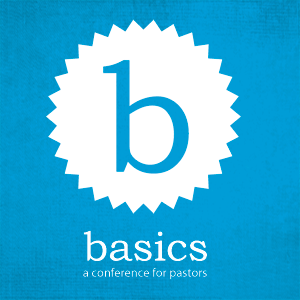 Alistair Begg’s annual “Basics Conference” is, in my estimation, far too underrated as a pastors conference. Each year Begg invites a select number of pastors and scholars to encourage ministers in the work of preaching and prayer. If you’ve yet to feast on the resources from these conferences make sure to head over to Truth for Life and download mp3s to your heart’s delight.
Alistair Begg’s annual “Basics Conference” is, in my estimation, far too underrated as a pastors conference. Each year Begg invites a select number of pastors and scholars to encourage ministers in the work of preaching and prayer. If you’ve yet to feast on the resources from these conferences make sure to head over to Truth for Life and download mp3s to your heart’s delight.
A Pricking with Piper
Over the weekend I listed to a few messages from the 2009 Basics Conference that focused on preaching to stir minds, urge wills, and renew affections. During the panel discussion John Piper was asked, “What do you believe the number one challenge will be for pastors in the next ten years?” His answer started off with some simple wisdom, but a peroration was on the way to those of us who preach God’s word. Listen to the clip below and be challenge to consider what you bleed.
Piper’s Answer: Same thing it’s always been: staying red hot for God, knowing their Bible, preaching it faithfully. I don’t think the main things change, the forms of challenges change, but the main thing about keeping your heart for God and knowing this book well, and understanding the lay of the land that changes [so quickly] today. If I had message to pastors it would be read your Bible and pray a lot. And pray earnestly for God to open His word to you, and preach it faithfully. And, you know, if you live in the world and look at the internet, if you see advertisements you see what’s there . . . I don’t work real hard at being relevant, trying to know the latest anything, I don’t know the latest anything! Because as soon as it’s there it’s gone and I can’t stay on top of it. Some things are so eternally relevant; everyone’s gonna die, everybody’s gonna get sick, everybody who’s married is going to have a horrible experience, everybody who raises kids is going to suffer like crazy. I mean, there are a few basic things that all human beings all the time walk through. If you have something to say to about these half a dozen real big challenges in life the little things that change [will fade away.]
Look if you had asked me what little handful of doctrines are going to be on the front burner or something that would be another question. I really think I would just leave it there and encourage you . . . whatever is going to be red hot in the next ten years will be gone pretty quick and people will still be the same and their needs will still be the same. Don’t be stupid. Don’t be culturally stupid and keep your head in the sand, understand there is an internet, there are televisions, there is music in the world.
Here’s what I thought of the other day. We were in preaching class talking about Spurgeon and how you do allusions, [the stuff that comes] just off the cough in your default language. And you know Spurgeon, you prick him and he bleeds Bible, right? Well, prick a lot of young pastors today and they bleed movies. I just said to the guys, “He bleeds movies, he bleeds music, he bleeds TV . . .” I said, “That sounds hip, that sounds cool, but it’s thin and it won’t carry you thirty years, probably. And it won’t help people die. It won’t help them in their marriages crises.” There are just so many young pastors so eager to grow and attract a crowd that they bleed movies. And when those young twenty-somethings get married, have kids, lose their babies—that blood coming out out is just going to be thin. You won’t sound cool at a funeral! It probably will be weird at a wedding. We’ve just turned so much of Sunday morning into a hip, cool, and entertaining talk time in order to feel a certain way. People’s souls are going to languish under that.
So all of that just to say, go ahead and just so be saturated . . . with the Bible.



